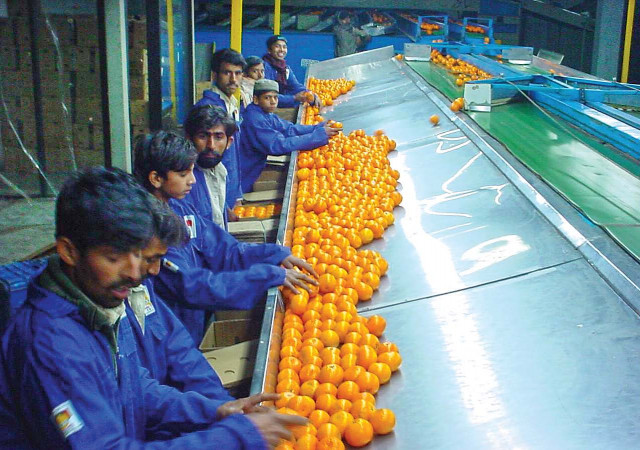Citrus exports: Kinnow exports falling due to a multitude of issues
Prospects may turn sour if care not taken to ensure quality and markets of fruit.

Pakistan, though a major citrus producer, is still lagging behind in modern techniques when it comes to enhancing the value of citrus exports. Only 10% of total production is exported, due to which citrus producers face severe financial constraints as it entails selling the produce locally; at lower prices.
Pakistan produces about two million tons of citrus annually, 90% of which is kinnow. According to the Agriculture Department, kinnow exports can hit 200,000 metric tons (MT) if modern techniques are adopted to add value according to international standards. Producers, as well as the government, should switch to latest technologies to mitigate post harvest losses, and enhance exports to help this industry grow properly.
The year witnessed a generally good crop: production of kinnows went up to 2.4 million tons and the export target was fixed at 300,000 tons; but the loss of Iran’s lucrative market and delays in consignments due to stringent commodity checks by customs authorities were major problems from the exporters’ view point. Furthermore, Sri Lanka imposed a special commodity levy on imports of fruit and vegetables which annoyed local exporters at a time when the citrus export season was underway.
In the past Iran has been a large buyer of Pakistani kinnows. It used to import around 60-70,000 MT of the fruit, and exports to the country had been targeted at 100,000 MT for this year. Due to sanctions from the US, Iran’s currency has been devaluated and it has practically stopped importing fruits and vegetables. What little quantity is being exported now is fetching very little in terms of foreign exchange for domestic producers.
The customs requirement of ‘100% checking’ of export consignments at ports also proved harmful to kinnows bound for international markets. Nearly 50 containers worth Rs80 million were rejected in the first phase of exports due to procedural delays by customs authorities. The fruit is kept in refrigerated containers, and exposure to heat and humidity during inspection ruined a sizeable quantity. Checking also delayed consignments, which in turn fetched low prices in destination markets due to deteriorated quality.
Moreover, due to escalation in the prices of important inputs to kinnow farming, farmers could not apply balanced doses of fertilisers, which aggravated quality problems. The year also witnessed a prolonged Monsoon which caused fungal diseases which created blemishes on the fruit, thereby ruining their quality. Furthermore, it was observed that citrus growers didn’t apply pesticides against insects which also caused blemishes and rendered the commodity un-acceptable in high end markets. The winter season also remained dry and witnessed unprecedented frost, which diminished the postharvest life of the fruit – rendering it soft and puffy.
Kinnows have been introduced in more than 20 countries of the world; however its full potential from international markets has not yet been tapped. For this, the government needs to implement reforms in the sector as per demands of sensitive markets such as Europe, Eastern Europe and Russia. These countries usually stress the implementation of Good Agriculture Practices (GAP) and a ensuring a maximum pesticide residual level, without which exports to these regions cannot be sustained. In this regard, Pakistani authorities need to take a lesson from the Australian Citrus Board, which developed a vibrant citrus industry in a record period of time.
Furthermore, it is important to comply with phytosanitary requirements outlined by importing countries for fruits. For example, the Iranian government had set a mechanism which required kinnows to be kept in temperatures of one degrees Celsius for 11 days to cure them of fruit fly and other diseases. Similar phytosanitary requirements of countries like the US and Japan similarly need to be followed accurately.
The country needs to pay head to a very important sector which has the potential of fetching precious foreign exchange. Without the introduction of modern agricultural practices in safeguarding and nurturing good quality produce, the viable markets for kinnows may be lost for Pakistani growers.
Published in The Express Tribune, April 16th, 2012.



















COMMENTS
Comments are moderated and generally will be posted if they are on-topic and not abusive.
For more information, please see our Comments FAQ